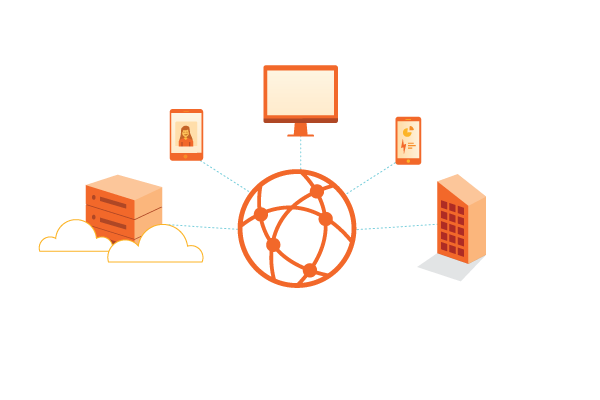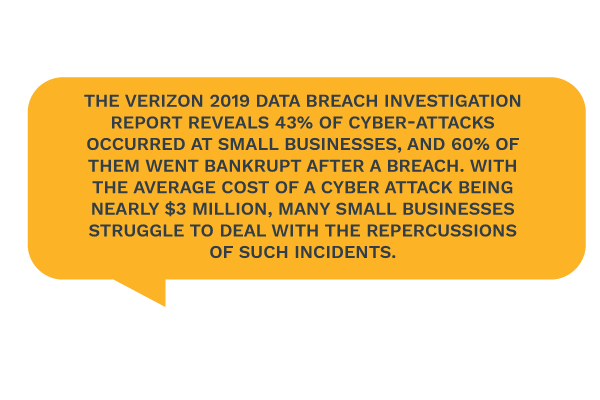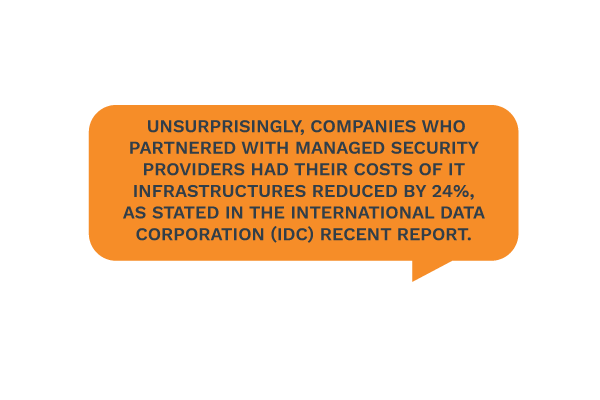With the increasing onslaught of massive data breaches and substantial economic costs that cyberattacks impose on the U.S businesses, even the seemingly best protected infrastructures still have gaps in their security system. A recent report by Cybersecurity Ventures predicts that cybercrime will cost an estimated $6 trillion by 2021, twice as much since 2015. As these crimes become more sophisticated and security standards become more complex, keeping up with proactive security measures is a challenge for any business with limited staff and low budget.

As cyber threats become worse, many business leaders are yearning for a trusted, managed security system to lean on for robust IT security and vulnerability management.
What are Managed Security Services (MSS)?
In short, a MSS are a network of solutions that oversee and monitor a company’s security processes. They offer a wide range of services to detect vulnerabilities and stop threats before they reach the organization’s endpoints.
Unsurprisingly, one of the reasons why SMBs are targeted by criminals is due to lack of in-house IT personnel to handle security functions or continuously monitor and manage their security environment. Since the costs of IT maintenance and the risk of insufficient security protection are too high, many small businesses choose an easier path by partnering with a trusted managed security services provider (MSSP).

Let’s take a look at some of the reasons for why businesses should take advantage of MSSPs to protect their confidential data while cost-efficiently mitigating the risk of malicious cyber-attacks.
Why Does a MSS Matter?
Proactive Security
As the cybersecurity professional shortage hit 3 million in 2019, enterprises, especially SMBs, struggle to attract and keep skilled workers as the number and severity of cyberattacks intensify. Ironically, it often takes an average of six months to find a qualified worker since hiring managers find most candidates lack skills and hand-on experience to combat today’s corporate hackers. A tight labor market, complicated hiring process, high cost of long-term workforce retention along with the organization’s lack of abilities to provide training and development opportunities to employees are the main reasons for why 65% of organizations report that they did not have enough IT personnel in-house.
Additionally, most SMBs are often focused on keeping their digital infrastructure operating at optimum performance, which consumes most of their IT department’s resources. Not only do they lack the IT security expertise to develop and keep an effective security stance, they lack the amount of money and time required to stay up-to-date on the increasing threats facing their organization. Lack of abilities and resources put the in-house IT workers in a position to only fix a security incident after it already occurred. This reactive approach is insufficient and costly to businesses in the long run.
The adoption of managed security services brings a huge benefit for SMBs struggling from internal skills shortages and budget limitations. MSSPs have security experts who are trained to “threat hunting” to actively look for all new threats and potential vulnerabilities as they arise. They also proactively oversee the entire network by managing the company’s updates and patches, regularly checking the system health, and working closely with their clients to give them more insights on how to improve their IT systems.
 With leading-edge, advanced solutions at hand, MSSPs ensure the security of an organization’s digital infrastructure by utilizing the most up-to-date technologies and the latest threat intelligence to round-the-clock monitor and detect vulnerabilities in order to suggest preventive solutions before a breach happens.
With leading-edge, advanced solutions at hand, MSSPs ensure the security of an organization’s digital infrastructure by utilizing the most up-to-date technologies and the latest threat intelligence to round-the-clock monitor and detect vulnerabilities in order to suggest preventive solutions before a breach happens.
Reliable Support
Every industry faces different regulatory issues that are unique to the sector when implementing a security program. Health providers have to meet the requirements of HIPAA, retail firms often have to comply with the PCI DSS, or publicly traded companies have to comply with Sarbanes-Oxley (SOX), to name a few.
MSSPs offer business support not only to meet compliance requirements, but also to specialize their cybersecurity program to each industry’s unique risks and threats. From developing an effective security system, defining control objectives, testing those controls against a norm, detecting vulnerabilities, or running penetration tests, MSSPs’ professionals specialize in developing customized security strategies for each individual company.
With a full array of security technologies and dedicated experts who constantly develop custom IT security strategies to meet business objectives, MSSPs provide real-time incident response and 24/7 managed security monitoring that are designed to give business more insights into global cyber threats and ensure the results are not false positives.

Business Focus
As the sophistication of cyber threats continues to grow, companies of different sizes have been challenged by defensive capability requirements and the need to balance security requirements with business goals. The time-consuming, expensive process of hiring and training in-house IT employees combined with the cost of purchasing necessary hardware and software consume too much time and resources that distract SMBs from maintaining a laser focus on their strategic initiatives.
Being equipped with a dedicated IT team to take on the latest and greatest cybersecurity techniques can be a challenge for some businesses with budgets but is rather feasible for MSSPs. By outsourcing some aspects of their security systems, companies can reduce the complexities associated with maintaining a secure infrastructure, allowing their SMBs to focus on their business goals while ensuring the security systems are all properly managed and protected.
Scalability & Flexibility
In this technological age, businesses often rely on the power of digital infrastructure for most aspects of their daily operational activities. As the business grows, the company’s overall productivity and security become more and more dependent on the scalable and flexible ability of equipment and IT reliability to stay ahead of evolving threats.
Scaling, however, requires not only just upgrading the size of infrastructure, but also providing training to the IT teams regarding the new security strategy. With limited budgets and resources, small and medium-size businesses often find difficulty in adapting to rapidly evolving needs of an agile IT environment.
One of the immediate benefits of partnering with a MSSP is the ability to upscale resources as demand rises – and, likewise, to lower availability when demand drops. MSSPs deliver a more flexible approach to control security by utilizing shared and customized infrastructure to help reduce costs — meaning more scalable and flexible solutions that can adapt to a company's changing needs — while assisting business in increasing visibility and achieving stability that they need to defend against threats.
 With access to a trusted MSSP’s wealth of cybersecurity knowledge, staff are free from day-to-day operational challenges. MSSPs ensure cyber security strategies and techniques continuing to detect any vulnerability in the system while at the same time, not impacting the organization’s operation lifecycles.
With access to a trusted MSSP’s wealth of cybersecurity knowledge, staff are free from day-to-day operational challenges. MSSPs ensure cyber security strategies and techniques continuing to detect any vulnerability in the system while at the same time, not impacting the organization’s operation lifecycles.
Cost Savings
As companies are shifting the burden of implementing best practice security controls or employing highly skilled technical IT teams on to MSSPs, they receive an unrivaled protection for a fraction of the cost. For cybersecurity alone, outsourcing can save business up to 80% of the cost of doing it in-house.
Reduced training/staffing costs. Without including costs for office space, training, and benefits, the average salary of a qualified InfoSec analyst alone is in the $100,000 range. Partnering with MSSPs will ensure business with an expert team with the latest knowledge of cyber threats and new cybersecurity technology techniques while keeping the costs of in-house employees at minimum.
Lower investment costs. Construction and maintenance of a cybersecurity system often require specialized hardware or equipment with an annual cost of licensing. MSSPs often spreads these fixed costs of technology investments and security personnel over a large customer base so each customer benefits directly from these savings.

No unexpected costs. The highlight from a recent debate that was discussed in Congress says that 60% of all small businesses go out of business 6 months after a cyber-attack. Cybers crimes have become so sophisticated that business leaders cannot afford to have subpar security. Since MSSPs proactively monitor and detect issues before they happen, businesses can avoid often-devastating costs, interrupted IT infrastructure, unexpected downtime and potential data breaches from damaging a company's reputation and affecting their bottom line.
As cybercrimes increase every year and each infringement seems to be more destructive and costly than the last, this tipping point gives business leaders an opportunity to look for an alternative approach that is more functional and cost-effective than an in-house IT team. Superior protection, reliable support, business focus, scalability, and cost savings are the five benefits that companies should expect when looking for outsourcing managed security services providers. Companies can focus on their business goals and rest assured that the organization's security system is protected by experienced IT experts constantly conducting security audits and improving time-to-value on company’s security investments.
Categories: Security, Managed Services











